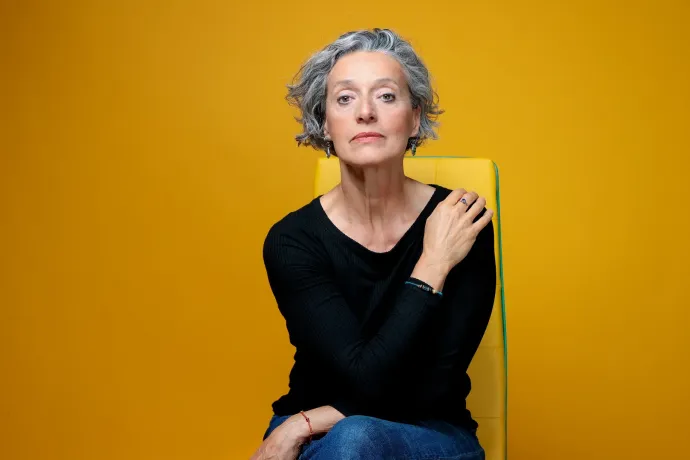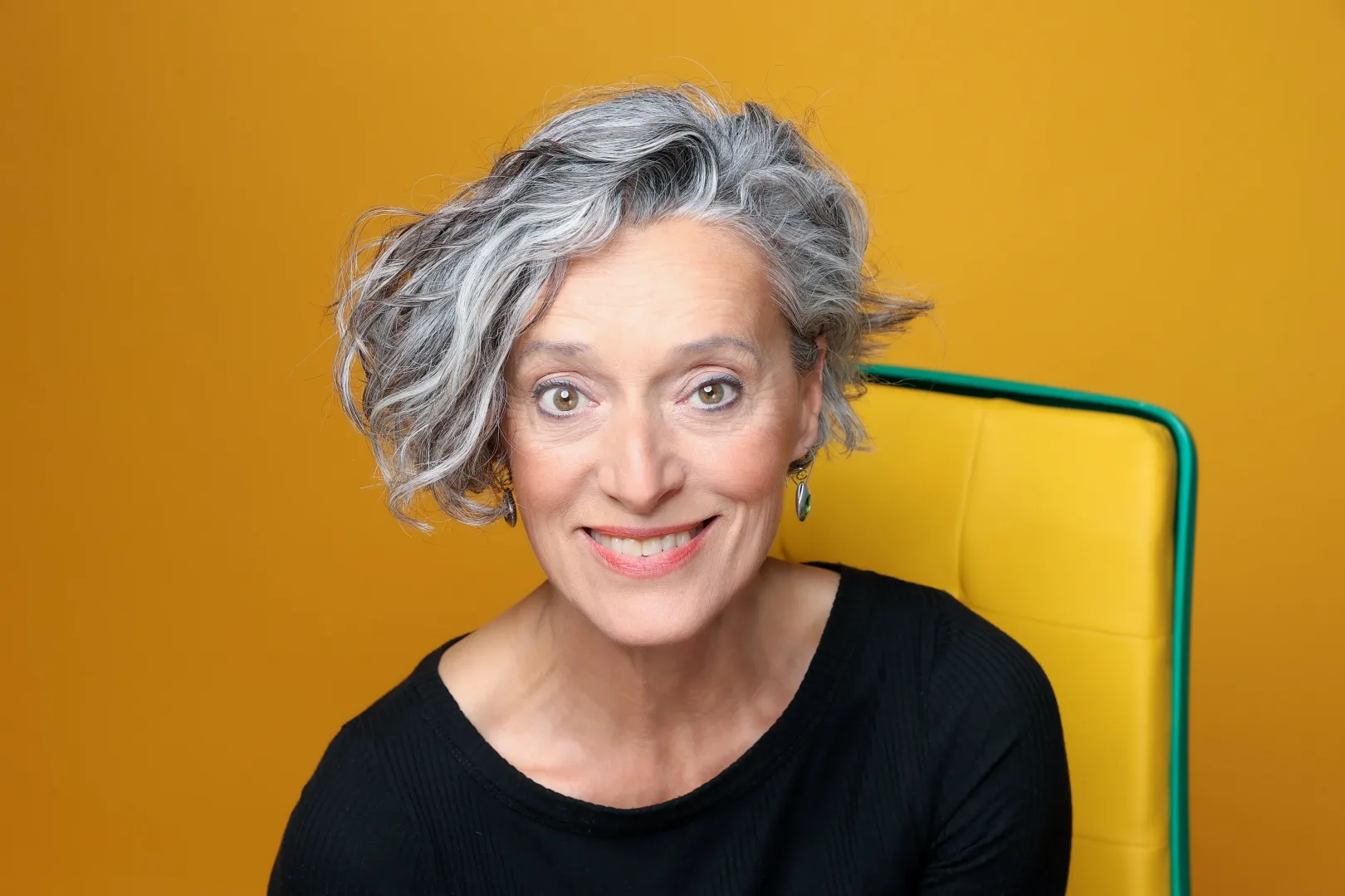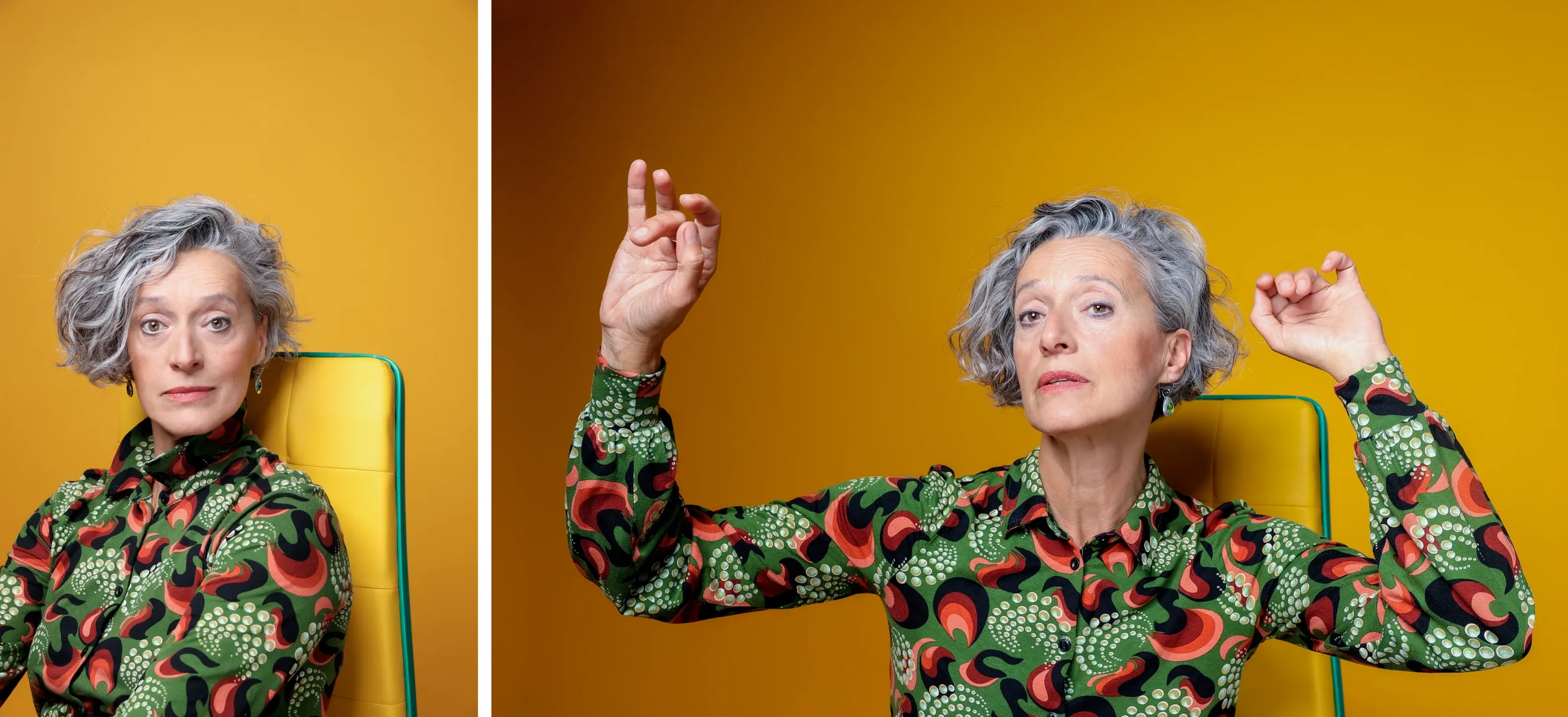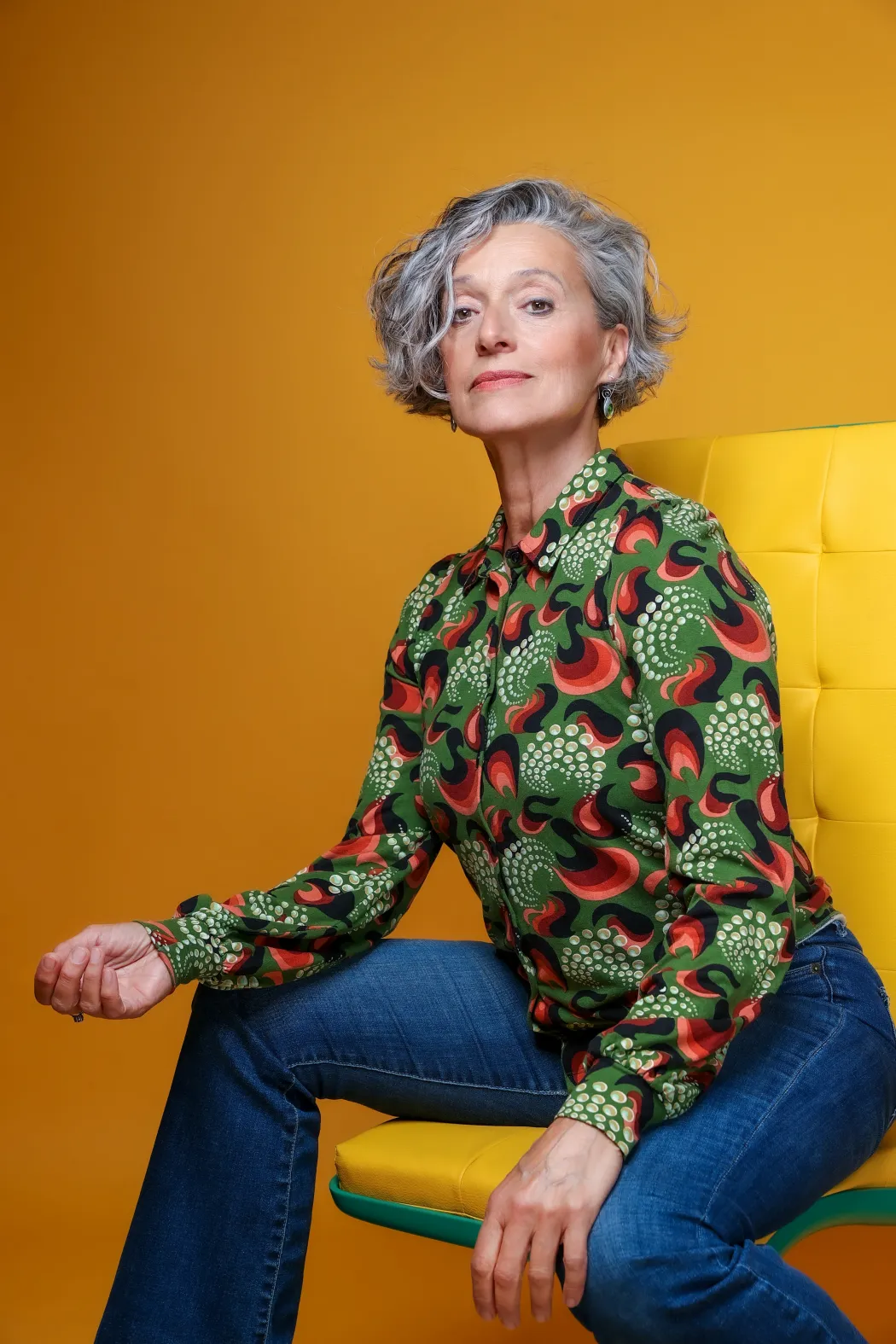
- As a child, Éva Magyar aspired to be a gymnast, then trained as a ballet dancer, and finally graduated from the musical department of the University of Theatre Arts. She was a member of the Kaposvár theatre in the 1980s and later founded a theatre workshop based on movement, gestures and visual effects under the influence of Pina Bausch, called Shaman Theatre.
- She toured abroad with this company several times and, thanks to British collaborations, later worked as an actor at the Globe in London, the Royal Shakespeare Company and at the National Theatre.
- She felt increasingly unappreciated at home, and being unable to adequately finance her troupe, she relocated to London in 2012, a year before her 50th birthday, along with her daughter, who was in high school at the time.
- Since then, she has appeared in numerous British and American films, including super-productions such as X-Men: First Class, but she also appeared in the second season of Russian Doll and the sixth season of Black Mirror. She regularly holds acting workshops for young people in Hungary and abroad and became a grandmother last year.
A few months ago, you wrote in an English-language post: "I was working on a film with Salma Hayek. She's funny and very professional, and between takes we talked about being a foreigner and an actress of a certain age, and how wearing high heels can add to the character one’s playing." How do high heels help?
This was on the set of the sixth season of Black Mirror, where I played the therapist for the character played by Salma Hayek. When Salma was on camera, I sat opposite her on a small ottoman; it was cold, so we were both wearing furry mammoth boots under the table. It made me feel like an elf instead of a serious psychologist, so I asked the crew if I could wear high heels even though it wouldn't be visible on film. Salma said she would like a pair too. We then discussed how the right prop can add so much to an actor's performance.
The post then continued with: "We are equals. The only difference between us is that her bodyguard kept staring at me." What kind of equality could there be between someone who's not just a famous star, but also the wife of the 31st richest man in the world, and a Hungarian actress?
My reference to equality was intended as irony. Because during filming, you may forget about the differences for a few moments, but when Salma Hayek's bodyguard keeps his eyes fixed on you, that does bring one back. I've worked with a lot of stars, but this was the first time someone brought their bodyguard on set.
When it comes to young actors, I also teach them that if they ever find themselves working with stars, they have to find that line where they're neither too much for them, nor too timid. Stars need you to be there for them, they need you to be their partner. If that's what you are, then it doesn't matter that they didn't even know you existed up until then. If you do this, then they'll turn to you between two camera changeovers and say: come, sit next to me, let's talk.
During your first years in London, you shared a barely 20-square-metre flat with your daughter. It was from there that a chauffeur-driven Mercedes took you to the casting of X-Men: First Class, and then you were cast as the mother of the character played by Michael Fassbender. Do you have many such extreme stories from the past twelve years?
I do have a few. I may be better known in the industry today, have a better resume and I may live in a bigger apartment, but those extremes will never disappear. In addition, as I get older, there are less and less roles, and even though I am getting better professionally, my market is shrinking. My life still includes enough struggles, but that's okay, I enjoy it.
How much of your career do you think is visible from Hungary?
I think that very few people know about me; but when I lived here, there were even less. I don't mind though, I never wanted to be so famous to have people stop me in the street. I always tell my students that it's not what you've achieved that counts, because the value of that is constantly changing: what was a big deal ten years ago probably seems like no big deal today.
I didn't become a movie star, but I've had an incredibly complex and long journey. I was a member of the Kaposvár theatre, I had my own company, I went to America, I emigrated to England, I made films, did choreography, taught. And I've continued to push myself into more and more precarious terrain.
David Bowie once said: “Always go a little further into the water than you feel you're capable of going. Go a little bit out of your depth and when you don't feel your feet are quite touching the bottom, you're just about in the right place to do something exciting.”
That's what I'm trying to stick to, and there still are lots of new things I want to try.
Does film use your qualities as a dancer?
I'm certainly a better dancer than Salma Hayek, but of the two of us, she was the one who starred in Magic Mike – and she looked like she was an amazing dancer. Of course, that's because she's a great actor and had a fantastic crew around her. I'm also expected to be able to run fast, shoot a machine gun, collapse nicely and die. When Kevin Bacon shot me in X-Men and I collapsed, Kevin immediately deducted that I had a background in motion theatre. He said,
“An actor doesn't just fall on their face like that.”
Since according to the story, this all took place in a concentration camp, they asked me to try to eat less in the days before the filming to keep my stomach flat. Later in the movie, when I played a dying woman lying on a bed next to Andrea Riseborough, it was enough to use my face to portray the suffering.

In a previous interview, you told us that when you played in the Hedda Gabler production at the National Theatre in London, alongside Ruth Wilson of The Affair fame, Meryl Streep and Anna Wintour came to see the play once. And you said you were sure that, for the first time in your life, you were going to mess up your lines. Have you overcome your anxieties about celebrities by now?
Even if I do get anxious, I've often experienced that in the important moments, I am able to be at my best. For example, in the TV series Mrs. Sidhu Investigates, which was directed by a man who has made music videos for Madonna and Bowie and which starred two British stars, Meera Syal and Craig Parkinson, I had a very intense, emotionally saturated monologue.
There I was, with these two British superstars standing in front of me and I had to concentrate really hard – I can't afford any frustration at a time like that.
Instead, I tell myself: this is my moment. In the end they really liked what I did.
The way you talk about managing yourself suggests that this comes easily to you: you regularly send emails to casting directors or postcards to directors. Where do you find the courage to do this?
That's the hardest part of the job, so it doesn't come easily at all. In fact, it often drains me to death. There are two things that help in such cases. One is when there is no other solution, because you have to feed your child, pay rent and buy a plane ticket to visit your mother at home. Necessity helps enormously.
The other is that it's part of the profession. It's not like in Hungary, where everybody knows everybody and there's no real need for that, but in England, if you don't advertise yourself, it's like giving up halfway through your career. Sending an email to an English casting director saying “look, here are my new photos and my new showreel”, is a natural part of the working relationship.
And if they keep turning you down?
Then you keep going. Maya Angelou says that if there's a door you've been banging on for a while and it won't open, you have to look at what opportunity may lie in that impossible situation. For example, during the pandemic I did a stand-up and a cabaret performance. Stand-up is incredibly popular in the UK, the productions are very professional, a lot of work goes into them and most of the performers are discussing important issues. It's a format that I have enough knowledge and life experience to do, and I have plenty to say as an actress, an aging woman, and an immigrant.
My dates alone provide plenty to talk about!
Of course, I don't exclusively use my own stories, but the stories always have a core of reality, and I build the texts around that. The genre of cabaret is essentially the same, but in a more spectacular way: it adds costumes, music and dance.
Who are your favourite stand-up artists?
I really like Bill Burr, for example. He puts things quite harshly and he's very good at intertwining the funny with the serious. I also like Ali Wong. I still need a few more months to develop my own stand-up character.
What was the last film role you were cast for?
I sent a selftape (where the actor first shoots a video of themselves for the production) for a role in a British crime series. The script is about a blonde Eastern European woman who has lived in England for twenty years but still has a slight accent and is a sort of modern madam: she runs a nightclub where people have sex with whoever they want and however they want.

We've arrived: you have often complained that the Anglo-Saxon film industry sees Eastern European actresses mostly as cleaners or whores.
That was indeed the case for a long time, but for me it’s been changing for a while: I recently played a wicked choreographer, and since the time they first found me with this therapist role, I've already been cast for such a role three times.
Gray hair and the activity and physique of a woman in her forties – what does your character mean to directors?
Anand Tucker, with whom I worked on the film The Critic, starring Ian McKellen, told me that the problem with me was that I was too special. If I was a star, that would be OK, because stars can be special.
But a housekeeper can’t be special.
It's hard to put me in small, supporting roles. But I think my character is very capable of a lot of things.
Do they ever think of you as a woman in love, as a sexual being?
No, and that's terrible, because a sixty year-old woman can also be in love, and so can a woman of ninety. Perhaps directors think that people don't like to see that kind of thing on film, or that it doesn't look good. I would like to continue to work to change this approach.
In the final scene of last year's Good Luck to You Leo Grande, Emma Thompson had to look at her naked body in a mirror and she later said it was one of the hardest things she had ever done: looking at her own body without judgment or shame. As someone who has worked with her body all her life, how familiar is this phenomenon to you?
There are two huge mirrors in the bathroom of my apartment in Budapest that "greet me" in the morning, so I have to be very careful. I also bought a small IKEA lamp, which has a muted yellow glow that nicely conceals some of the details. But on a serious note, it's madness how this feeling of shame is being instilled in women.
Men look much worse for wear at this age, but they remain extremely confident.
I am sixty-one years old, and no matter what I do, I will never again look the way I did when I was twenty. It's not as if I wasn't constantly told that there was something wrong with my body when I was a young gymnast: first I was too thin, then when I started to fill out at the age of eighteen, my coach said I was too fat. But looking back, I see that I had a beautiful body.
Then when I started at the College of Theatre Arts, several directors had a problem with my nose. One of them said that playing a positive character with such a big nose was impossible and that I should have had surgery a long time ago. Fortunately, I now know that none of that matters. The only thing that matters is that
we don't allow the bad feelings from the bottom of our stomach to move up to our heads when others are saying stupid things.
And our goal should never be to one day be accepted by everyone, because that will never happen.
What is your weekly exercise routine?
Whenever possible, I practice yoga in the morning, I run two or three times a week and swim regularly. Even in winter, in cold water. And if I have any sort of problem or just want to get some exercise, I put on some music and dance. Up to several times a day. But not two to the right, two to the left, but in full frenzy. I have no idea what the neighbour across the street must think when they see me like that.

In the Hungarian short film "Not yet today", you played a woman battling symptoms of early dementia. How did you prepare for this job?
Director Domonkos Gyimesi was the one who had offered me the role, coincidentally just after my mother had died of dementia. So I didn't have to do any special preparation, I pretty much know everything there is to know about dementia. And I learned a lot from my mother's illness.
What can dementia teach us?
First of all, it teaches you to let go of things that you previously thought were very important. At first I thought it was very important that I tell my mother, for example that I was there yesterday and I did bring what she had asked for, it’s just that she doesn't remember. Sometimes when we had spent the whole day together and had a really good time, at the end of the day she would say "Oh, that was really good, I'm sorry, I forgot your name". And then you try not to cry, but just tell her your name is Éva. Or when she was sad about something,
I'd get a balloon, blow it up, throw it to her, she'd bounce it back, we'd start playing, and she'd forget what had made her sad.
One time we went on holiday to Lake Balaton together. It was like going with a child. She asked for an ice cream every five minutes, because she forgot she had just had one. Why confuse her with the truth? So I just said: sure, we'll buy ice cream! She went in the water in the morning, and I could barely get her to come back out. So I stood on the shore with the mothers who were there with small children, and waited for her to come out. All that mattered in those moments was to make her happy.
Will you incorporate this defining experience in some kind of project?
I'm sure I will. I've already been thinking about making my own short film about how what one knows about dementia can be passed on to family members, along with the fear. With this disease, you're constantly jumping into big, dark, black holes, and you just hope there's a bottom where you can get back on your feet. Compared to the courage needed for that, self-management is really not a big deal.